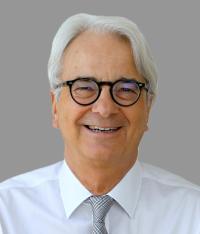Alfredo Morabia, MD, PhD, MPH
- Professor of Clinical Epidemiology
On the web

Overview
Morabia completed his undergraduate studies at College Calvin in Geneva in 1971, majoring in Greek and Latin. After receiving his MD from the School of Medicine at the University of Geneva in 1978, Morabia trained in internal medicine at the University Hospital of Geneva and in occupational medicine in Italy. He is board certified in both internal medicine and occupational medicine. In 1986, Morabia received a grant from the Swiss National Science Foundation to study at the Johns Hopkins School of Hygiene and Public Health, where he obtained MPH and PhD degrees in epidemiology, the first such PhD awarded to a Swiss citizen, and an MHS in biostatistics. In August 1990, he became chair of the Clinical Epidemiology Unit at the University Hospital of Geneva, the first epidemiology group ever created in a Swiss hospital and creates the Bus Santé (Health Bus), an on-going health and nutrition survey of the Geneva population, designed after NHANES. Under his leadership, the unit grew into a division, and he was subsequently appointed professor of clinical epidemiology at the University of Geneva. In 2009, he was appointed Fellow of the Royal College of Physicians of Edinburgh. He is currently a professor of clinical epidemiology in the Department of Epidemiology at the Mailman School of Public Health, Columbia University, New York, and a professor of epidemiology at the Barry Commoner Center for Health and the Environment at Queens College, City University of New York. His research domains are urban health and the history of methods. He is the Principal Investigator of a cohort study funded by NIOSH on cardiovascular diseases among men and women who volunteered during the months following the 9/11 attack to clean the debris of the WTC towers. He was supported by the National Library of Medicine to write on the history of epidemiologic and public health methods and concepts. This support resulted in two books: "Enigmas of Health and Disease: How Epidemiology Contributes to Unravel Scientific Mysteries," published by Columbia University Press in 2014, and "The Public Health Approach: Population Thinking from the Black Death to COVID-19," published on October 17, 2023, by Johns Hopkins University Press. Dr. Morabia lectures and teaches on the history of epidemiology and public health internationally in English, French, Spanish, Portuguese, and Italian. Alfredo Morabia served as the Editor-in-Chief of the American Journal of Public Health (AJPH) from June 2015 to June 2025, and serves as Editor Emeritus of "Epidemiology in History" at the American Journal of Epidemiology.
Academic Appointments
- Professor of Clinical Epidemiology
Credentials & Experience
Education & Training
- MD, 1979 University of Geneva
- MSc, 1990 Johns Hopkins University
- PhD, 1990 Johns Hopkins University
Committees, Societies, Councils
Professor of Epidemiology, Queens College of City University of New York
Editorial Boards
Editor-in-Chief, American Journal of Public Health, June 2015 to June 2025
Editor Emeritus, Epidemiology in History, American Journal of Public Health
Honors & Awards
2013 “Advice to young scientists,” Erasmus Medical Center (August 30), Netherlands Institute for Health Sciences Graduation Ceremony
2013 Keynote lecturer, “Hundred years (and more) of epidemiology at Harvard.” First Cutter Symposium, Harvard School of Public Health
2024 Impact Award of the American Public Health Association
Research
History of epidemiology and public health
Research Interests
- History and Ethics
- Urban Health
Selected Publications
MORABIA A. The Public Health Approach: Population Thinking from the Black Death to COVID-19. Johns Hopkins University Press, 2023
BROWN TM, MORABIA A. Public Health Then and Now: Landmark Papers from American Journal of Public Health. American Public Health Association, 2022. ISBN: 978-0875533261
MORABIA A. Pandemics and methodological developments in epidemiology history. J Clin Epidemiol. 2020 Sep;125:164-169. doi: 10.1016/j.jclinepi.2020.06.008. Epub 2020 Jun 12. PubMed PMID: 32540385; PubMed Central PMCID: PMC7291979
REMCH M, LASKARIS Z, FLORY J, MORA-MCLAUGHLIN C, MORABIA A. Post-Traumatic Stress Disorder and Cardiovascular Diseases: A Cohort Study of Men and Women involved in Cleaning the Debris of the World Trade Center Complex. Accepted for Publication in: Circ Cardiovasc Qual Outcomes. 2018; 11: e004572. DOI: 10.1161/CIRCOUTCOMES. 117.004572 June 2018.
MORABIA A. Enigmas of Health and Disease. How Epidemiology Helps Unravel Scientific Mysteries. Columbia University Press, 2014.
MORABIA A (editor). History of epidemiologic methods and concepts. Basel, Birkhauser, 2004. ISBN 3-7643-6818-7
Urban Health Activities
WTC- Heart: WTC- Heart is a cohort studies of men and women who volunteered to clean the WTC site during the first year after the 9/11 attack. The objective of the study is to assess the long term consequences of this cleaning activity on their cardiac health. The project is funded by CDC-NIOSH.